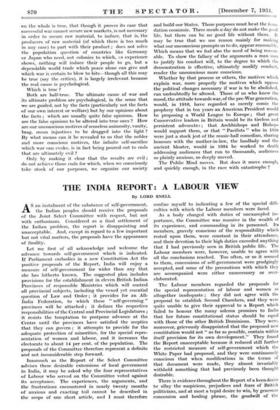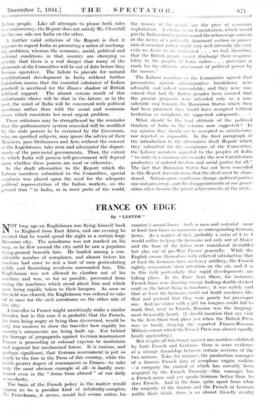THE INDIA REPORT : A LABOUR VIEW
By LORD SNELL
AS an instalment of the substance of self-government, the Indian peoples should receive the proposals of the Joint Select Committee with respect, but not with enthusiasm. Considered as a final settlement of the Indian problem, the report is disappointing and unacceptable. And, except in regard to a few important but not vital matters, the proposals have the appearance of finality.
Let me first of all acknowledge and welcome the advance towards self-government which is indicated. If Parliament embodies in a new Constitution Act the positive proposals of the Report, India will enjoy a measure of self-government far wider than any that she has hitherto known. The suggested plan includes provisions for the establishment in eleven British Indian Provinces of responsible Ministries which will control all provincial subjects, including the vexed yet essential question of Law and Order ; it provides for an All- India Federation, to which these " self-governing " provinces will be attached ; it defines the respective responsibilities of the Central and Provincial Legislatures ; it resists the temptation to postpone advance at the Centre until the provinces have satisfied the sceptics that they can govern ; it attempts to provide for the adequate protection of minorities, for the special repre- sentation of women and labour, and it increases the electorate to about 14 per cent. of the population. The proposals of the Committee therefore represent a definite and not inconsiderable step forward.
Inasmuch as the Report of the Select Committee advises these desirable extensions of local government in India, it may be asked why the four representatives of Labour who served on the Committee voted against its acceptance. The experiences, the arguments, and the frustrations encountered in nearly twenty months of anxious and exacting toil cannot be described in the scope of one short article, and I must therefore confine with to indicating a few of the special diffi- culties with which the Labour members were faced.
As a body charged with duties of unexampled im- portance, the Committee was massive in the wealth of its experience, and commanding in its personnel. Its members, gravely conscious of the responsibility which rested upon them, were constant in their attendance, and their devotion to their high duties exceeded anything that I had previously seen in British public life. The Labour members were, however, unable to agree with all the conclusions reached. Too often, or so it seemed to them, concessions of self-government were grudgingly accepted, and some of the precautions with which they are accompanied were either unnecessary or over- elaborated.
The Labour members regarded the proposals for the special representation of labour and women as altogether inadequate ; they did not agree with the proposal to establish Second Chambers, and they were quite unable to give their approval to a Report. which failed to honour the many solemn promises to India that her future. constitutional status should be equal with those of the other British Dominions. They were, moreover, grievously disappointed that the proposed new constitution would not " as far as possible, contain within itself provision for its own development." They found the Report unacceptable because it reduced still further the restricted measure of self-government which the White Paper had proposed, and they were continuously conscious that when modifications in the terms of that document were made, they almost invariably withheld something that had previously been thought desirable.
There is evidence throughout the Report of a keen desire to allay the suspicions, prejudices and fears of British politicians, and at most a tepid desire to win, by generous concession and healing phrase, the goodwill of the Indian. people, ,,Like all attempts to .please both sides to a controversy, the Report does net satisfy Mr. Churchill on the one side nor India on the other. ..
A further valid criticism of the Report: is .that it appears to regard India as presenting a series_ of unchang, Mg problems; whereas the economic, social, political and cultural conditions in that country are changing so quickly that there is a real danger that many of the proposals of the Committeewill be out of date before they become operative. The failure to provide. for natural constitutional development in India without further legislation ,means.that the essential substance of Indian goodwill is :sacrificed for the illusive shadow-of British political support. The almost certain result of this unfortunate choice will be that in the .future, as in the past, the mind of India will. be. concerned with political questions rather than with the social and economic issues which constitute her most urgent problem.
These criticisms may be strengthened by the reminder that the parliamentary system Conceded will be modified 1w the wide powers to be exercised by the Governors; who, on specified subjects, may ignore the advice of their Ministers, pass Ordinances and Acts without the consent of the Legislatures, take over and administer the depart- ments of the provincial governments. Thus, the extent to which India will possess self-government will depend upon whether these powers arc used or otherwise.
In the: draft-alternative to the Report which the Labour members submitted to the Committee, special emphasis was placed upon the need for the adequate political representation of the Indian workers, on the ground that " in India, as in most parts of the world, the masses of the issyle are the prey of economic exploitation. A change in the Constitution, which would put the Indian rural populat ion and the urban wage-earners at the mercy of a politically dominant section in posses- sion of economic power, might very well intensify the very evils we desire to see eradicated . • . we feel, therefore, that the British people cannot. discharge their responsi- bility to the peoples of India unless . . . provision is made_ for the ultimate attainment of political power by the masses.'' The Labour members on the Committee agreed that precautions against administrative breakdown were advisable and indeed unavoidable, and they were con- vinced. that had the Indian peoples been assured that the present proposals were intended only as a con, siderable step towards the Dominion Status which they had been promised. they would have accepted without hesitation or complaint. the suggested safeguards. .
IVhat should be the final attitude of the political thinkers of India to • the reforms - now suggested ? In my opinion they should not be accepted as satisfactory: nor rejected as impossible. In the final paragraph of the introduction to t he alternative draft Report which they submitted for the acceptance of the Committee, the Labour members appealed to the peoples of India " to unite in a common aim to make the new Constitution productive of ordered freedom and social justice for all." The fact that. Dominion Stattis has not been conceded in this Report does not mean that the ideal must be aban- doned. Nations grow. conditions change, political parties rise and pass away, and the disappointments of one gener- ation often become the proud achievements of the next.



















































 Previous page
Previous page